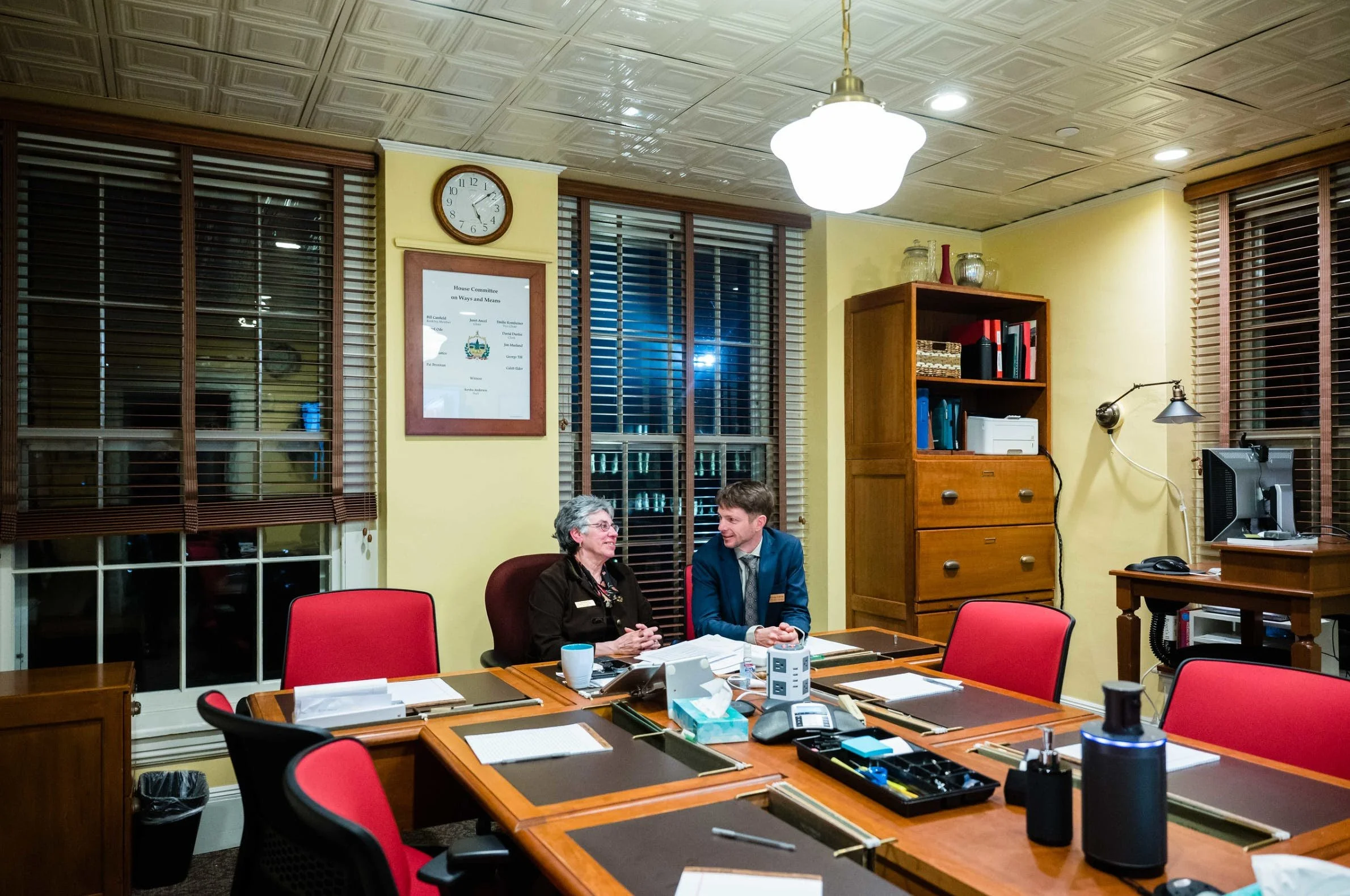Accountability for education dollars
2023-03-20
Dear friend,
I love hearing from residents. Here's a snippet from today:
"Clearly you don't represent us at all. You don't listen to us. You just want your stipend and your control. You will do anything to get the committee assignment you desire, a committee that will further kill our rural community."
"You need to remove yourselves from our lives. All we want is an emergency safety mechanism. We do not want the Government to do anything other than safety, sovereignty, and be an emergency fill-in on a temporary basis. An exception may be the elderly and 'truly' disabled."
Fact check -- Corrections & Institutions did not top my list going into the Legislature. I got picked for it because of my professional background with buildings. I am grateful for the assignment. How's it going? Stream us anytime to judge for yourself -- here's a good episode.
Chair Emmons and Clerk Roberts in House Corrections & Institutions at the end of a day.
The first time I learned of the existence of the Joint Judicial Rules Committee was when the Chair of Judiciary asked me if I would be willing to serve on it, 10 minutes before the Speaker appointed me last Tuesday.
I'm not sure what I did to deserve that, but here's my guess. Our Capitol is a place where if you work, you are rewarded with more work. (For the same $17k/year stipend, either way.)
Regarding the resident's other point, I respectfully disagree, based on Article 68 of the Vermont Constitution. It says that "a competent number of schools ought to be maintained in each town unless the general assembly permits other provisions for the convenient instruction of youth."
We would have a Constitutional issue on our hands if we cut off our schools from public spending. And I would argue that our public schools are essential to our rural communities.
There is an issue, however, that the House Education Committee is seeking to address with Bill DR 23-0910 (full text of current version).
The purpose of this committee bill is to provide increased public accountability and oversight of approved independent schools eligible to receive public tuition. This bill does not apply to all private independent schools in Vermont. It applies to those schools that seek and obtain approval to receive public tuition dollars.
The sending of public dollars to private schools as a matter of course comes from Vermont's unique history.
If students live in a school district that does not operate a school for some or all grade levels K-12 (“nonoperating towns”), a school district may pay tuition to the school of a student’s choice. That can be a public school in another school district or an approved independent school.
This system has been in place in Vermont for over 100 years, and it evolved due to geographic necessity in sparsely populated rural pockets of Vermont.
In 2020-2021, roughly 6,000 students were publicly tuitioned to both public and independent schools. Half chose to attend public schools and half chose to attend approved independent schools. During that school year, the State of Vermont spent roughly $50 million to send students to approved independent schools.
Given the significant amount of public money paid to approved independent schools and the recent U.S. Supreme Court decision in Carson v. Makin, the committee's bill would increase accountability and oversight.
If passed, the bill would require the following of Approved Independent Schools:
Enroll any student who requires special education services and who is placed at the school as an appropriate placement by the student’s individualized education program (IEP) team or by the local supervisory union.
Report attendance, enrollment changes, academic progress, State-mandated assessment results, and student performance data to a tuitioned student’s sending school district.
Adopt and implement policies to comply with the VT Public Accommodations Act (VPAA) and the Vermont Fair Employment Practices Act (VFEPA).
Prevent bias and discrimination during the admissions process.
Maintain a public tuition rate that is the same or lower than the tuition rate for private payer students.
Be located in Vermont or located in another state within 25 miles of the Vermont border.
This bill appears to provide important accountability for our Education Fund, while not restricting the current options of Windham-6 residents.
DR 23-0910 will be debated on the House floor this week. If passed by the House, it would go to the Senate, which often has its own take on things.
Do you have any input?



